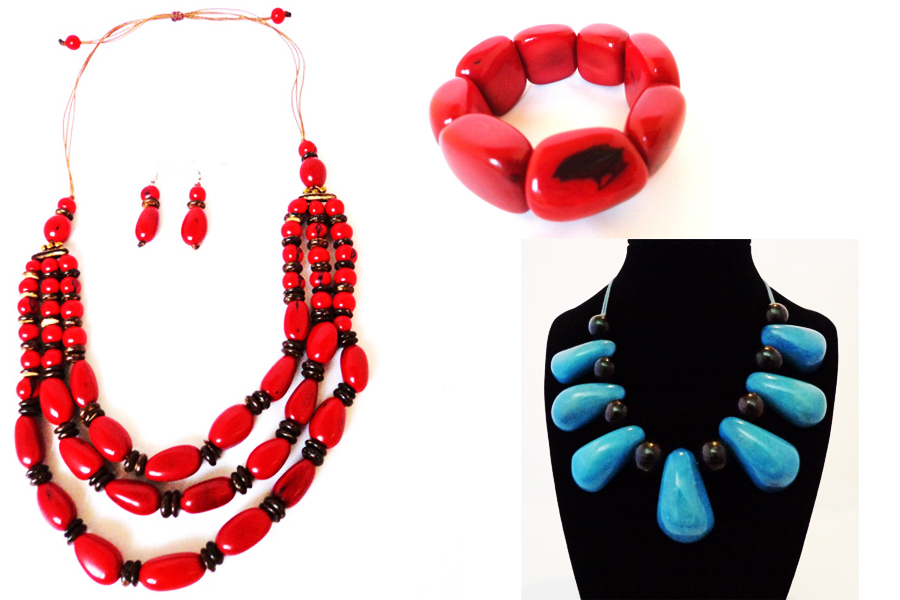Angelica Cocha's Eco-Vogue Jewelry Grows in East Quogue

With the current emphasis on natural materials and sustainable products, a budding company in East Quogue has taken a fashionable approach.
Eco-Vogue, run by agricultural engineer Angelica Cocha, is an ecologically friendly, sustainable and organic line of jewelry, handmade with “vegetable ivory”—the nut of the Tagua tree. The company is focused on the environment, the economy, the social impact and their customer base. Cocha designs the necklaces, bracelets, and earrings and then has them handmade in Ecuador by a variety of small artisan communities.
The large Tagua nut, about the size of a chestnut, has been in use for hundreds of years in South America. It can be polished, sliced and colored in a variety of ways—but left in its natural state, it resembles ivory. The use of Tagua nuts helps improve local economies by generating jobs and reducing the cutting down of the rainforest.
Cocha founded Eco-Vogue in 2010. “I earned my degree as an agricultural engineer, so I saw firsthand what was happening to the environment in South America, as well as to the villages there,” she says from her home studio. “After finishing an internship in the U.S., I returned to Ecuador and was assisting in the Community Tourism Federation of Ecuador. Working as a translator, I got to know people from about 100 communities in Ecuador, and I got to see the amazing handcrafts they make. Unfortunately, the lack of support and education keeps these communities in poverty, and their crafts remain unknown. I got the idea to design jewelry when I realized the growing global demand for eco-friendly pieces with a high standard of quality. There is so much plastic in the world now—this is a way to reduce that.”
According to Cocha, the artisans in Ecuador have a long history of handcrafted jewelry, and they use all the parts of the plant the Tagua nut comes from. The nut is used to make buttons, the bark and wood is used for housing and the leaves for thatched roofs. The nut can also be carved into small figurines, including chess pieces. Growing in the rain forest, the tree produces new seedpods constantly, blooming three to four times a year.
In addition to the total usage of the plant, the business avoids deforestation, offers an alternative to ivory from slaughtered elephants and keeps the ground free from mining for metals and stones. It reduces migration to big cities, and keeps families together in small villages, improving the quality of life. Customers can feel good about a high quality product that is eco-friendly in many ways at an extremely affordable price. Many of the necklaces and bracelets are priced under $100, with pieces starting at $25.
“It’s very important to me to keep a global perspective on this business,” Cocha says, “as the situation is really quite urgent, but it has to be fashionable and attractive too.”
The large nuts are highly polished and gleam like jewels in earthy colors that come from vegetable dyes. The nuts in the collection, combined to create statement necklaces and chunky bracelets, feature different looks for different seasons. The grain of the nut can also look like wood. Strung together with smaller nuts and seeds on cords, the collection’s offerings have the look of high-end designer jewelry. The bracelets come on stretchy bands, in rich colors.
The Eco-Vogue line has been picked up by Ann Taylor stores across the country, and its products are available to order online through their website. The site includes a video of the process, from harvest to polishing to carving and dyeing.
“There are also studies showing that wearing natural items—from clothing fibers like cottons and silks to stone and nut jewelry—reduces stress on the body. Plastic and nylon aren’t healthy for anyone, so it makes sense that wearing natural items might just be good for you as well as the earth,” Cocha says.
For more information, visit eco-vogue.com.



